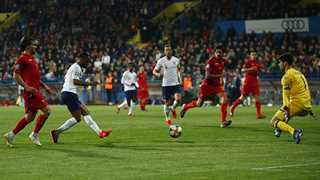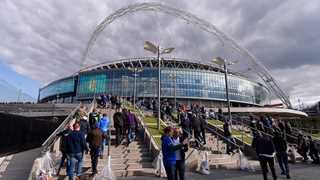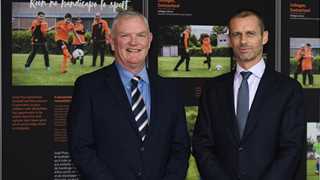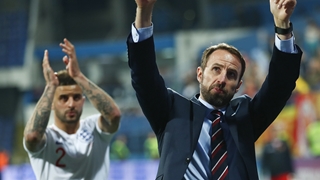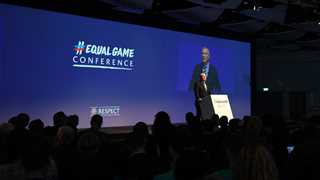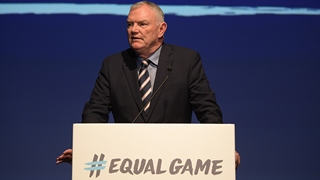
Welcome to Wembley where the English FA is proud to be hosting UEFA’s Equal Game conference.
I’d like to congratulate UEFA and Aleksander on this great initiative and I look forward to this opportunity to share new ideas and best practice across our UEFA member associations.
I had a full speech prepared, looking at how far we’d come over the last 50 years including the changes we’ve all made and the progress that football has championed.
But I’ve changed it I’m afraid.
I first need to reflect on the racist abuse the England players received in their qualifier last Monday.
Let me be clear, I am using this match as an example of something that is happening in all our societies, across all of Europe including England and I am not pointing a finger at one country.
None of us can be naïve enough to believe racism doesn’t happen in each of our nations, at everyone’s matches.
It’s happened in the UK over this current season for example.
I’m pleased that clubs here have taken swift action to ban fans and we’ve banned a player for on-pitch racism too. But that is really a bare minimum and clearly more needs to be done.
We must do more in England, including here at The English FA, and we must do more across Europe and we must do this together.
That’s why we are here today. To work together, to make sure football is For All.
I was particularly pleased to see after the events of last week, Aleksander and UEFA making such a firm statement, calling racism “a disaster” and taking action quickly. That’s the strong leadership we need in order to ensure that we really do have an Equal Game.
But now we must put some concrete actions in place to better support our players. So I want to propose some first steps for our discussion today.
When UEFA’s three step protocol came out, it was a watershed moment. It was firm action. A proposal on how to deal with racism in stadia.
Like every policy, it needs to evolve. We need to see if it works and we need to see if it can be improved. I think it can.
The protocol asks the referee to stop the match if “racist behaviour is of a strong magnitude and intensity”. I don’t now think that is good enough and we should take this opportunity to revisit these thresholds.
The young men and women who take to the field representing our clubs and countries not only deserve, but should be entitled, to play their football in a safe environment entirely free from racial abuse.
There should be no judgement call on whether something is of a strong magnitude. Racism is racism.
I understand the protocol was designed for mass chanting, but receiving a torrent of vile, racist abuse from one person when you are taking a throw-in or a corner is wholly unacceptable too. So we should look again at our definitions to make sure the protocol covers this, because this needs to stop.
How we deal with incidents and work with clubs is something we are looking at in England at the moment. Last week, at our Board meeting, we agreed to review our processes for spectator misconduct and how clubs are sanctioned. We will now be taking that forward to consultation with the Leagues.
I also worry that there is an undue burden on the player to report incidents themselves.
We all know what racism looks like. We should see how we can better report incidents through the UEFA match delegate or through employing specific spotters and take the weight off the players’ shoulders and act ourselves. We have a duty to protect them; the responsibility should not be on them to instigate action.
When incidents do take place in the crowd, we also need to ensure they can be dealt with quickly and efficiently.
We need to ensure our stewards too are supported. That they are knowledgeable and ready to act.
It’s clear we need to do more here and racism and discrimination should be a specific module of their training across Europe. It must be an integral part of the support we provide to them.
We’re updating this approach in England at the moment. We created steward training called “On The Ball” here a few years ago, which had specific discrimination modules.
This training is currently being updated by the Premier League and English Football League and how to approach discrimination will be a fundamental part of this new approach too.
I would also like to see a review of on-field incidents too.
I understand completely that when two people are involved in an exchange it is often the word of one person against another. But actually that’s not the case anymore. The grounds that competitions are played in are full of cameras, recording every angle.
In England we investigate thoroughly every alleged discrimination case - on or off the field. It can be a very long process; employing foreign language lip-readers and experts in slang to try to understand what was said and what it meant.
But we should go that extra mile. We owe it to our players.
Everyone here at the English FA is just completing an updated set of safeguarding training. One of the first rules is to listen to the person who has been affected and believe them.
That doesn’t just apply to safeguarding though, it applies to discrimination, and is something we have learned the hard way at the English FA in recent years.
I believe we have to review every case; checking all the evidence; looking at all the camera angles; taking accounts from players and individuals - whether or not it’s been in the official match report.
As I said at the start, football has come a long way on the journey to create an Equal Game; but we’re not there yet and we need to keep going.
A huge amount of good work has been done across Europe and through UEFA. But the journey continues and we need to ensure that our approach evolves.
I am not standing before you today and saying “UEFA must do something”. We are UEFA, we are the member associations that, together, make European football great.
If we work together, and that’s exactly what summits like this are for, we can help to change football.
So I’d like to propose that we collectively look at a few specific proposals.
Firstly, we should look at how cases involving racist behaviour are reviewed and dealt with and consider how we can make sure the burden is not on the players to create a safe environment for themselves.
This is timely as the new guidelines for match officials are currently being prepared in the revised Safety and Security Regulations and the UEFA executive committee could agree a new approach and put something into these regulations fairly quickly.
Secondly, that we ensure all stewards have support and training to deal with racist behaviour.
And thirdly, that we reduce the threshold for player-to-player discrimination to ensure all cases are brought forward.
I very much hope these are issues that I will have the support of UEFA Colleagues to raise at the FIFA Council too.
So far, I’ve talked largely about sanctions and enforcement. But, in our experience this cannot be delivered without education.
In England we have tried to improve awareness through videos, films and campaigns.
We have imbedded reporting protocols across football with reporting lines through Kick It Out, directly to clubs and the English FA. The players’ federation has set up a counselling helpline too.
The English FA visits players at their clubs at the start of every season and reminds them of their behavioural responsibilities, but also their options for reporting discrimination. The Leagues run their own programmes with players too.
But let’s be honest – these are programmes and rules generally being devised and approved by a collection of white, often ageing men.
As Gareth Southgate pointed out last week – “as a white, middle-aged guy talking about racism – it can be a difficult subject to broach”- I know how he feels.
So we need to do something about that too.
Last year, the English FA introduced a new equality, diversity and inclusion plan called “In Pursuit of Progress”, and we’ve set ourselves some specific targets to change things.
We have targets, because in my experience, what gets measured gets done.
For example, we have put a specific emphasis on diversity in the workforce.
We’ve just announced our gender pay gap results. Over the last year we’ve reduced our mean pay gap from 23 to 18 per cent. Our median pay gap has also reduced to 11 per cent. There’s still a gap, but compared to other industry averages- construction at 16 per cent, manufacturing at 20 per cent and finance at 40 per cent; we’re moving in the right direction.
Our Board now meets our Government’s diversity targets which require 25 per cent of the Board to be female. The criteria, however, doesn’t have a requirement for black, Asian or minority ethnic Board members, so we ensure representation through our Inclusion Advisory Board chair joining our Board meetings and at the moment have an additional diverse Board member too.
I think that all of us need to look at its leadership structures to ensure we are representing those playing.
We have also made changes to our elite coaching set up at St. George’s Park.
We have put in place a version of American Football’s Rooney Rule. This means that, if candidates with a black, Asian or minority background apply for a coaching job and meet the job specification’s criteria, we guarantee an interview for at least one of the candidates.
Again, we have specific targets for the number of female and minority coaches working in the England set-up and have put in place a programme which ensures a diverse coach is working with each of our teams in order to gain experience. One of our graduates from this programme, ex-England defender Sol Campbell, has since become a full-time manager at Macclesfield.
We also provide coaching bursaries for aspiring female and minority coaches to ensure that cost is not the barrier for the next generation of diverse talent.
However, while we are in pursuit of progress, we are also, in my opinion, a long way from success.
So from the Boardroom down to the smallest of grassroots clubs we need to be more diverse.
We need to listen more to the young, diverse players in our game. When Raheem Sterling, Danny Rose or Callum Hudson-Odoi speak with such maturity and confidence – we must listen and respond.
We must not let them down.
But let me conclude with some wider thoughts.
Much of what I have mentioned today concerns societal issues that have been magnified by football.
Football is a magnificent window into society – both its best and worst parts.
We must, of course, address the worst.
But we all have a great opportunity to use football to showcase the best.
To use football as a force for good, bringing people together and uniting communities.
Every one of you across your respective nations will know of specific projects which focus on a particular societal problem and uses football as a tool to help.
That is why we are here today, to share how we work.
To challenge the worst and celebrate the best of football.
I hope you enjoy the Equal Game conference. It’s a pleasure to welcome you all here to Wembley to discuss what is a hugely important challenge for both society and the game.
By learning from each other, listening to our young diverse players and working together we will be able to continue to use the power of football for good.
To lead an Equal Game For All.


